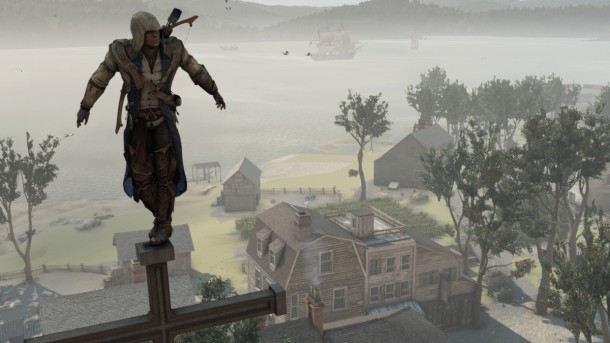Our Verdict
Entertaining storytelling and fantastic naval combat marred by terrible mission design and endemic feature creep.
PC Gamer's got your back
I am pursuing a man in a tricorner hat through the streets of colonial New York. In the top-left of the screen, Assassin's Creed III instructs me to chase him. In smaller text just below it, there is a secondary objective: 'do not shove or tackle anyone'. I turn sharply into an alleyway and barge past a woman, earning myself a red X on the mission log and losing my 'full synchronisation' bonus. I'm not sure why I want to be fully synchronised, but the completionist in me insists that I try again.
A few attempts later, I've figured out a system. Stop sprinting when the alleyways give out onto open streets, edge carefully around pedestrians, and continue. It's ludicrous - why on Earth would I not shove someone, if the fate of a nation was at stake - but I've not incurred the red X, I've not lost my bonus. I chase the man and, as is tradition, wait for the cutscene where I catch him. It doesn't come. We pass through the same fishmarket for the second time and I realise that we've done a lap of central New York. The game is waiting for me. Oh! I think. This is an assassination. I do those.
I can't get close enough to use my hidden blades so I wait until we're running down a clear alleyway, pull my flintlock, and fire. Desynchronised! Target was killed. Try again.
It takes another couple of tries before I figure out that the game wants me to catch him - tackle him , if you will. My objective is to give chase. My sub-objective is to not tackle anyone . The solution is to tackle someone. You may Google your own facepalm jpeg.
Assassin's Creed III features the silliest and most self-defeating mission design in the the series' history, and it's a huge shame. When it isn't directly hamstrung by constrained mission areas, flakey AI, and imprecise movement, it manages to steer you into the path of these flaws anyway with optional objectives that encourage you to game the system - and Assassin's Creed III's systems do not hold up well to gaming. When full sync bonuses were introduced in Brotherhood, they were designed to encourage creative use of the tools at your disposal. Here they more often tamp down your options, exposing the emptiness of the game underneath. You can ignore them, sure, but you can't ignore the signal sent by that big red X.

There's a lot more to an Assassin's Creed game than its missions, but the fifth in the series drops the ball with such regularity that it resonates through the entire experience. A pervasive sense of frustration is the snare drum that accompanies Assassin's Creed III on its march through the American revolution.
You undertake that march - for the most part - as Connor, a young assassin with a British father and a Native American mother. Connor's quest to negotiate a future for his people against the backdrop of revolutionary war is well written and often well acted. The game's treatment of issues of race, class, democracy and empire even manages to be insightful, and Ubisoft have no qualms about turning America's founding mythology on its head. Characterisation is strong. Connor will get some flak simply for not being Ezio, but he comes into his own in the second half of the game. Assassin's Creed III has a cracking villain, too, in a senior British Templar that the writers seem to like more than they do their ostensible lead.
The game suffers for a lack of female characters - the only real exception being Connor's mother, who after a brief period of activity retreats from the stage to usher in the series' next male protagonist. It's a shame that the game does not do more, given how laudably it addresses themes of repression in other contexts.
There is also, of course, Desmond. Creed's sci-fi metanarrative splutters to a stop, pulling together its various precursor races, ancient artifacts and cosmic threats for a conclusion with the dramatic impact of a wheezing cat finally sicking up all over the carpet. It's not all bad: a handful of present-day missions let you see what Desmond's time in the Animus has taught him, and Danny Wallace's character has somehow metastasized from the human equivalent of Clippy from Microsoft Word into a likeable person with something to say about history.

There's a lot going on, then, and a lot to do. The new Animus bombards you with side-missions, collectibles and challenges, often without heed to what you're doing or whether the tone will be ruined by the sudden notification that you're in the top 50% in the world for whistling. Its three main explorable areas - Boston, New York, and the compressed frontier that links them - are liberally sprinkled with men to stab, lists to fill out, and every other form of open-world busywork you can think of.

Crafting returns, expanded from Revelations' bomb-making into something far larger and far harder to rationalise in the context of a game about a man who stabs people. Combining materials gathered through hunting and purchased from settlers in your homestead allows you to make a wide array of items for further crafting or trade - from barrels to booze, venison jerky and Franklin stoves. You can top up your supply of arrows and other consumables in this way, but it's far quicker and not very much more expensive to just buy them. The system feels irrelevant and the cumbersome interface prevents it from simply being a breezy distraction. It's one example of the many ways that Assassin's Creed III manages to draw the player away from what is fun or meaningful. It's like thrusting a pile of dried fruit and a bottle of Captain Morgan into the hands of a pilot and telling him that he's allowed to make rum and raisin ice cream now. That's nice, Assassin's Creed III. Do you mind? I'm flying a plane.
Puppeteer-style controls are gone, replaced with traditional keybindings: interact, attack, secondary weapon and so on. The verisimilitude suggested by the old arms, legs and head system has been lost, but the new way is clearer and for the most part it's a worthy change. The animation team deserve credit for the way that Connor moves through the environment - the seamless transitions from ground to tree-branch, from street to interior, from attack to canned takedown animation. Assassin's Creed III manages to incorporate detail that other games would force into quick-time events into the flow of regular play, and as a result it's substantially less compromised than you'd expect by its cinematic ambitions. If 'less compromised than you'd expect' sounds like guarded praise, then that's because it is.
Counter-riposte combos are still the dominating force in combat, but what exactly constitutes a riposte has been diversified: firing lines mean grabbing an enemy to use as a shield, and heavy foes are better responded to with quick, aggressive jabs at their defences than waiting for them to attack. No more Ezio-style multi-man murder sprees spring from a single tap of the attack button. Hoisting the leader of a roaming patrol into the trees with a rope dart before slamming to the ground and taking out his friends with a few precisions strikes builds on the best of what the series is good at, which is self-contained, satisfying bursts of action. Moments like this are one of the key things that protect Assassin's Creed III from outright mediocrity, but the problem is that they have to be staged by the player in the open world: the game's main missions, which should be an opportunity to encourage creativity, more often actively punish it.

The game looks substantially better on PC but otherwise this is an underwhelming port. Keyboard and mouse controls can't be rebound and feel like an afterthought, so play it with a gamepad. The game ran at 30-50 fps on full settings on an Intel i5 760 system with 8Gb of RAM and a Radeon HD 6970. A few dips to 20 fps while in busy cities necessitated dialing back shadow quality a little. The game uses Ubisoft's Uplay system, but a permanent internet connection isn't required and all you lose for switching to offline mode is a few entirely missable unlockables.
The root of my issue with Assassin's Creed III is this: that for as much stuff as it provides, the amount that it actually allows you to do feels thinner than ever. A vast amount of its content can be reduced to 'get from A to B and push a button', and stealth rarely strays from minigame territory: 'try to stay in the circle', 'try to stay in the circle when it's moving '. It's about pattern recognition rather than creative thought, binary reactions with no room for life or dynamism. Ubisoft clearly hope that top-grade presentation will be enough to convince you that holding forward to make Connor walk between cutscenes is somehow satisfying - but it isn't. Players deserve the freedom to make up their own minds. Isn't that what Assassin's Creed purports to be about?
Assassin's Creed III's basic mechanics fare much better in multiplayer, where human opponents - or allies, in the co-op Wolfpack assassination challenges - provide the depth and dynamism that the single-player game lacks. The other area where the game excels comes entirely from left field: naval combat.

Connor moonlights as a privateer captain in a series of optional sea missions that thread in and out of the main plot. During these you take the helm of an Assassin frigate, barking orders at your men and steering your warship into broadsides and boarding actions. It's absolutely spectacular - weather and ocean effects create a phenomenal sense of place, and control is just arcadey enough to be exciting while retaining the heft associated with 18th century naval warfare. What's more, the mechanics are actually interesting, rewarding tactical thought in a way that sits flush with Assassin's Creed's broader historical mission statement. Why is Assassin's Creed suddenly the best Master and Commander game ever made? I have no idea, but I'm glad that it is.
It is not that the rest of the game feels rushed. The production values on display hit the heights of what this industry is capable of. It's quixotic, but often admirable for it. Assassin's Creed III is not a half-assed game: but it is approximately half ass. Frequently during my twenty hours with it I'd find myself wishing that other body parts had played a bigger role. Brains, perhaps, for rethinking the necessity of crafting or trading or courier missions or Desmond. Hands for testing and determining that, no, it is not fun to be whacked with a great big red X for failing to abide by pedantic and inartfully implemented rules. Assassin's Creed III rises above mediocrity by virtue of its ambition, its writing, and the set-piece moments where its best ideas form ranks and push. It's the sequel that proves that a revolutionary rethink is needed, but not the sequel that pulls it off.
Entertaining storytelling and fantastic naval combat marred by terrible mission design and endemic feature creep.
Joining in 2011, Chris made his start with PC Gamer turning beautiful trees into magazines, first as a writer and later as deputy editor. Once PCG's reluctant MMO champion , his discovery of Dota 2 in 2012 led him to much darker, stranger places. In 2015, Chris became the editor of PC Gamer Pro, overseeing our online coverage of competitive gaming and esports. He left in 2017, and can be now found making games and recording the Crate & Crowbar podcast.



